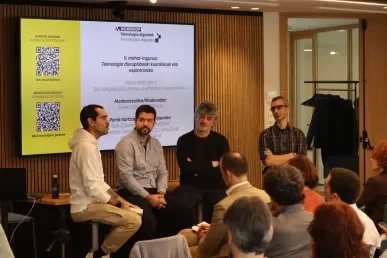Meeting on the digital future of Euskadi
CIC nanoGUNE participates in a meeting organized by BRTA to analyze the current situation and establish clear strategies for Euskadi and Europe in the field of digital technologies. Researchers Fèlix Casanova and Fernando González-Zalba have participated in a round table to present the advances in spintronics and quantum technologies.

The meeting on digital technologies took place on Friday, January 24 at the Ikerlan headquarters in Arrasate. At the meeting, organized by the Basque Research & Technology Alliance (BRTA) together with Ikerlan and Vicomtech, experts in digital technologies have shown the work being developed in the Basque Country.
Digitalization is progressing at a dizzying pace, revolutionizing areas such as industry, energy, mobility, food and health. In this context of continuous transformation, it is crucial to understand the current reality and define the strategies to follow, both in the Basque Country and in the rest of Europe.
The day began with a welcome address by Ricardo Bueno, BRTA Director. This was followed by the presentation of BRTA's digital technologies research agenda, a strategic document that addresses the main challenges, priorities and solutions in the digital field and acts as a roadmap to address the challenges and opportunities that digitalization brings with it. The day concluded with five thematic round tables that allowed an enriching debate on the opportunities and challenges that digital technologies present for industry, academia and society in general.
Ikerbasque researchers at nanoGUNE, Fèlix Casanova and Fernando González-Zalba participated in the round table on “Disruptive technologies: quantum and spintronics” together with Eneko Osaba and Xabier Vidal from Tecnalia. Casanova stressed the importance of advancing in the development of spintronics to produce more efficient chips such as those they are designing with the multinational Intel, called MESO technology. “One of the problems of today's silicon technology is energy consumption. If you count the global expenditure, 8% of the world's electricity is used in information technology. This happens because the devices we handle consume more, but especially because there are many more devices such as computers, cell phones or giant servers that store everything we upload 'to the cloud'. Therefore, designing chips that consume 20 or 30% less, such as what we are proposing with MESO technology, would mean great savings at a global level”.
González-Zalba highlighted the opportunity for the Basque Country to promote research into quantum technologies that contribute to the design and development of quantum computers, which promise to help us solve problems of high computational complexity such as the design of new drugs or the production of new sustainable materials. The researcher explained how “at nanoGUNE we have opted for quantum chips based on silicon technology - the same technology that forms part of the microprocessors in our computers, cell phones and cars - with the aim of using the existing manufacturing infrastructure of the semiconductor industry. This technology represents a promising alternative to other quantum computing technologies, as it will take advantage of years of development, knowledge and capabilities of an already consolidated silicon industry”.
All attendees agreed that, “this event has been a meeting point for collaboration between institutions, companies and technology centers, highlighting the importance of working together to meet the challenges of digitization”.
